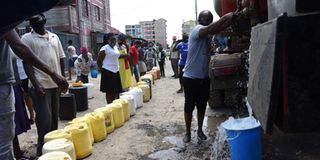Nairobi water woes to persist for 15 more years, warns agency

Umoja Residents in Nairobi queue to get free water from the Sonko Rescue team
The perennial biting water shortage in Nairobi will persist for at least another 15 years, Athi Water Works Development Agency (Awwda) has said.
The capital city would have been water-sufficient by 2026, but implementation of various water projects has experienced delays, pushing back their completion dates.
Awwda Chief Executive Officer Michael Thuita says Nairobi will only be water-sufficient by 2035 if all ongoing projects are implemented according to plan.
City residents have been experiencing water rationing since April 2017, with a majority getting water only twice a week and others going for even months without the essential commodity.
“If all the water investments are undertaken the way they have been planned, then we will have enough water by 2035. If not, the situation will get worse,” said Mr Thuita.
Currently, water demand in Nairobi is at 810 million litres daily against an installed production capacity of 550 million litres, leaving a deficit of 260 million litres. The demand is estimated to be increasing by 20, 000 cubic meters per year.
Awaiting testing
On a day-to-day basis, Ndakaini Dam and Ngethu treatment plant supply 480 million litres of water to the city. Sasumua supplies 59 million litres while Ruiru 1 Dam and Kikuyu Springs contribute 26.8 million litres.
In the meantime, Awwda has announced that Kigoro water treatment plant, which will treat 140 million litres of water daily, is complete and is currently awaiting testing before its commissioning between December and January next year.
The Sh4.7 billion plant in Murang’a County is expected to support Ng’ethu in treating extra water flowing to Ndakaini from the Northern Water Collector Tunnel.
The plant will convey water from Ndakaini Dam to Kigoro treatment plant. It will then convey treated water from the plant to Gigiri reservoirs, reducing the current water demand in the capital city by more than half.
But in the medium term, the State agency is continuing to build the 59-metre high Karimenu II Dam, to be completed by April 2022. It will be supplying 70 million litres of water daily to Nairobi and its environs.
“The project, which is set to be fitted with 55 kilometres of pipeline and a 23 million litres storage tank, will benefit one million people in Ruiru, Gatundu North, Juja and parts of Nairobi,” read a notice.
There is also the Embakasi concrete water reservoir, the upgrading of Kabete pump station as well as a five-million-litre concrete reinforced water storage tank in Uthiru.
In the long-term, the agency is working on three projects — Ndaragu II Dam to supply 173 million litres of water to Nairobi, Maragua 4 Dam to supply 140 million litres and Gatei Dam to supply 55 million litres daily.





